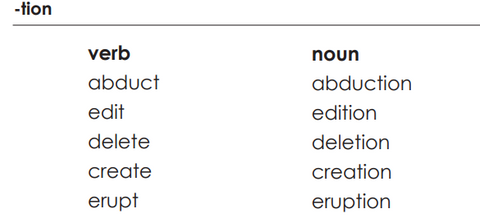Yes, I know it isn't a suffix...
Before I get bombarded with comments, yes, I know <tion> is not a suffix, and yet I teach it as a whole unit. Yikes! I can sense so many of you want to jump to the comment section to set me straight, but please read this article to the end before you do! I have felt strongly about this for a while. I will say loud and proud: I teach <tion>, <sion>, and <cian> as units; I call them word endings. Why? Because I can’t say <ion> as a sound found in /shən/ as <tion>. Speech to print, right?
Now let’s look at all the ways we can actually pronounce <ion> at the end of a word.
- /ēən/ as in scorpion
- /ən/ legion, the job of the <i> is to soften the g
- /yən/ onion
- /īən/ lion as in v/v division
My favorite resource on anything spelling-based is D. W. Cummings. I bow to his knowledge and common-sense way of explaining American English spellings. On his website, he lists <ion> like this.

So what is a suffix? And whose definition of a suffix is correct? Like all of the verbiage confusion connected with phonics instruction, the definition of a suffix varies. What I do know to be accurate is that suffixes can be inflectional, containing grammatical information, or derivational, changing the word's meaning. I consider -tion as a derivational suffix. Adding <ion> to a word ending in /t/ changes the word from a verb to a noun with a loose meaning of “being”.

How many times have you done an intake with a student, and they write menshun for mention or a similar error? So we are back to my reasoning for teaching <tion> as a unit. So often, we are reminded to teach speech to print. To get /sh/, <t> and <i> must stay together. Combine that with <on> and the result is /shən/. When teaching the words ending -ion with an initial <t>, I use this to demonstrate spelling.

As we work inside the speech-to-print model, as Maryanne Wolf suggests, I don’t know how else I could approach this. Of the many /shən/ spellings, I introduce -tion first. I teach my students the generalizations of words containing <tion> to help determine if the word ending is -tion, -sion, or -cian. I will talk more about -sion and -cian in another post.
- vowels before -tion will be long except <i>, which will be short
- often, base words ending in /t/ will be -tion: vacate becomes vacation
- the most common way to write /shən/ is -tion
- you will never find a double <t> in words containing -tion
How do you handle error correction by eliciting questions once you have introduced these words?
An example:
me: what’s the word?
student: mention
me: how many syllables are in mention?
student: two
me: what is the first syllable?
student: men
me: what is the second syllable?
student: /shən/
me: how do you write the word ending /shən/?
(of course, most of the lesson surrounded this concept, and he quickly would have said, oh, ya, t i o n.)
I agree with the SWI folks that teaching word origins and derivations is a very valuable skill. They are very good at what they do with morphology. I enjoy the morphological aspect of words too! I want to expose my students to a lot of words and historical references. Words with <tion> endings are loaded with fun roots! My favorite roots to introduce early on when teaching end blends are the -ct roots. These roots are so helpful when teaching -ck + ed in words like ducked. Your student can quickly be brought back to the correct spelling by understanding the word's meaning. When it is time to introduce /shən/, your student will be able to divide so many words morphologically!
- in/spect/ion
- de/duct/ion
- re/act/ion
- pre/dict/ion

I created a fun game to work on the -ct roots called Duct, Duc, Duce!

Once a student has mastered two or three-syllable words containing /shən/, you have the opportunity to dive deeper into spelling and decoding. My students are always so proud of themselves as they read through the multisyllabic word lists I have created. My word book More Words contains several pages of these words.

So thank you for hearing me out! I would love to hear what you think and how you teach -tion a.k.a -ion. Leave a comment below and let’s get a conversation started.
Happy times with /shən/!
Hey, thanks again for reading this far!
Did Duct, Duc, Duce interest you?
Use code ducks for 15% off this fun game for a limited time!

Comments
Leave a comment